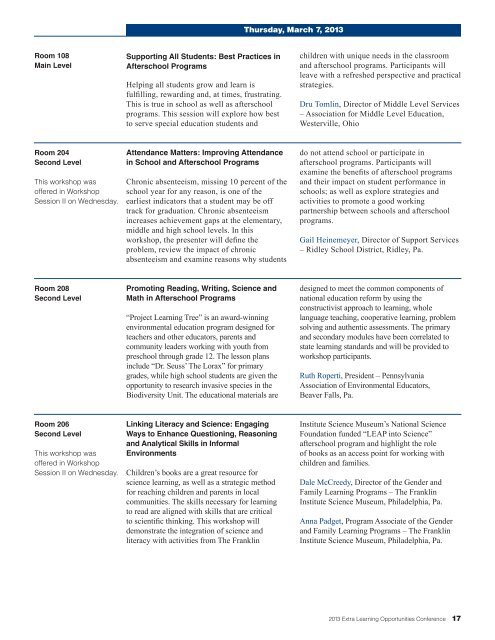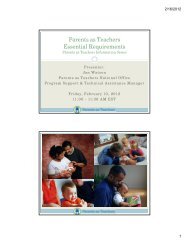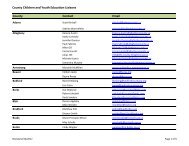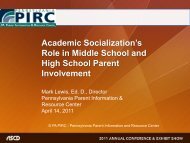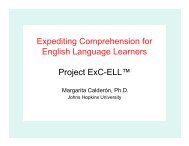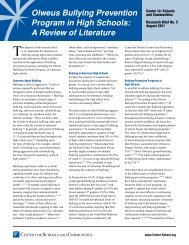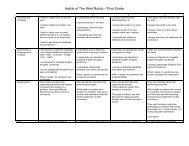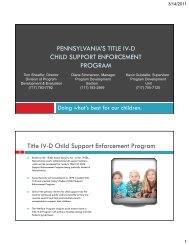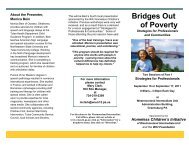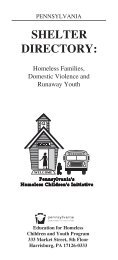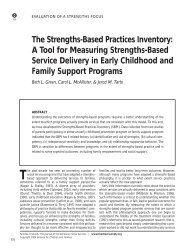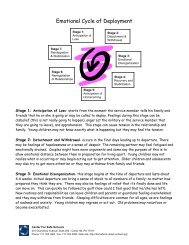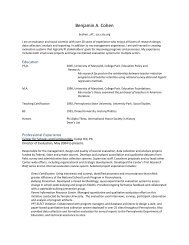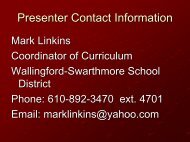Download the Agenda - 21st Century Community Learning Centers
Download the Agenda - 21st Century Community Learning Centers
Download the Agenda - 21st Century Community Learning Centers
You also want an ePaper? Increase the reach of your titles
YUMPU automatically turns print PDFs into web optimized ePapers that Google loves.
Thursday, March 7, 2013<br />
Room 108<br />
Main Level<br />
Supporting All Students: Best Practices in<br />
Afterschool Programs<br />
Helping all students grow and learn is<br />
fulfilling, rewarding and, at times, frustrating.<br />
This is true in school as well as afterschool<br />
programs. This session will explore how best<br />
to serve special education students and<br />
children with unique needs in <strong>the</strong> classroom<br />
and afterschool programs. Participants will<br />
leave with a refreshed perspective and practical<br />
strategies.<br />
Dru Tomlin, Director of Middle Level Services<br />
– Association for Middle Level Education,<br />
Westerville, Ohio<br />
Room 204<br />
Second Level<br />
This workshop was<br />
offered in Workshop<br />
Session II on Wednesday.<br />
Attendance Matters: Improving Attendance<br />
in School and Afterschool Programs<br />
Chronic absenteeism, missing 10 percent of <strong>the</strong><br />
school year for any reason, is one of <strong>the</strong><br />
earliest indicators that a student may be off<br />
track for graduation. Chronic absenteeism<br />
increases achievement gaps at <strong>the</strong> elementary,<br />
middle and high school levels. In this<br />
workshop, <strong>the</strong> presenter will define <strong>the</strong><br />
problem, review <strong>the</strong> impact of chronic<br />
absenteeism and examine reasons why students<br />
do not attend school or participate in<br />
afterschool programs. Participants will<br />
examine <strong>the</strong> benefits of afterschool programs<br />
and <strong>the</strong>ir impact on student performance in<br />
schools; as well as explore strategies and<br />
activities to promote a good working<br />
partnership between schools and afterschool<br />
programs.<br />
Gail Heinemeyer, Director of Support Services<br />
– Ridley School District, Ridley, Pa.<br />
Room 208<br />
Second Level<br />
Promoting Reading, Writing, Science and<br />
Math in Afterschool Programs<br />
“Project <strong>Learning</strong> Tree” is an award-winning<br />
environmental education program designed for<br />
teachers and o<strong>the</strong>r educators, parents and<br />
community leaders working with youth from<br />
preschool through grade 12. The lesson plans<br />
include “Dr. Seuss’ The Lorax” for primary<br />
grades, while high school students are given <strong>the</strong><br />
opportunity to research invasive species in <strong>the</strong><br />
Biodiversity Unit. The educational materials are<br />
designed to meet <strong>the</strong> common components of<br />
national education reform by using <strong>the</strong><br />
constructivist approach to learning, whole<br />
language teaching, cooperative learning, problem<br />
solving and au<strong>the</strong>ntic assessments. The primary<br />
and secondary modules have been correlated to<br />
state learning standards and will be provided to<br />
workshop participants.<br />
Ruth Roperti, President – Pennsylvania<br />
Association of Environmental Educators,<br />
Beaver Falls, Pa.<br />
Room 206<br />
Second Level<br />
This workshop was<br />
offered in Workshop<br />
Session II on Wednesday.<br />
Linking Literacy and Science: Engaging<br />
Ways to Enhance Questioning, Reasoning<br />
and Analytical Skills in Informal<br />
Environments<br />
Children’s books are a great resource for<br />
science learning, as well as a strategic method<br />
for reaching children and parents in local<br />
communities. The skills necessary for learning<br />
to read are aligned with skills that are critical<br />
to scientific thinking. This workshop will<br />
demonstrate <strong>the</strong> integration of science and<br />
literacy with activities from The Franklin<br />
Institute Science Museum’s National Science<br />
Foundation funded “LEAP into Science”<br />
afterschool program and highlight <strong>the</strong> role<br />
of books as an access point for working with<br />
children and families.<br />
Dale McCreedy, Director of <strong>the</strong> Gender and<br />
Family <strong>Learning</strong> Programs – The Franklin<br />
Institute Science Museum, Philadelphia, Pa.<br />
Anna Padget, Program Associate of <strong>the</strong> Gender<br />
and Family <strong>Learning</strong> Programs – The Franklin<br />
Institute Science Museum, Philadelphia, Pa.<br />
2013 Extra <strong>Learning</strong> Opportunities Conference 17


